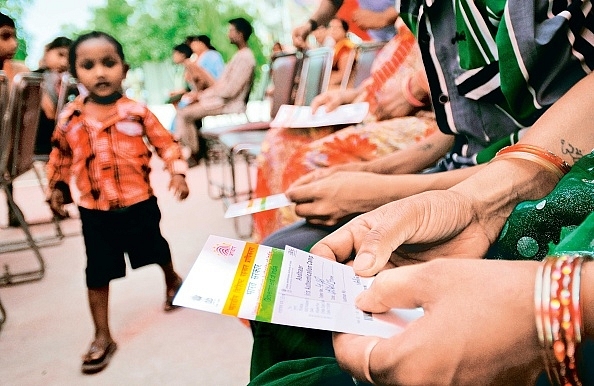Economy
Modi’s Smart Welfare Hits States Roadblock
- State governments are proving to be an impediment in Modi Sarkar’s ambitious work.
- Big states like the opposition ruled Uttar Pradesh, Bihar, and Karnataka are set to miss the Centre’s July-end deadline.
- Even certain BJP ruled states are proving to be laggards.

Photo Credit: Getty Images
State governments are proving to be big impediment in Modi Government’s ambitious work of covering all National Rural Employment Guarantee Act (MGNREGA) workers with Aadhaar cards and making sure that their payments are made through the Aadhaar-based payment bridge. The states ruled by the opposition parties in particular are among the big laggards, but some BJP-ruled states are not doing great either.
The Economic Times (ET) report (14 June) says that many big states, especially those ruled by the opposition like Uttar Pradesh, Bihar, and Karnataka, are set to miss the Centre’s July-end deadline of seeding all MGNREGA workers with Aadhaar cards.
Last month, the central government had set an ambitious target of achieving 100 percent success in making all MGNREGA payments to the beneficiaries by direct bank transfer, after getting their consent. For this purpose, it directed the state governments to set up special camps. However, the results show that the state governments are failing. The ET report tabulates the performance of six big states. Here are its findings:
West Bengal has 1.34 crore MGNREGA workers. Only seven percent (22 lakh) of them are receiving Aadhaar-based payments. Since 15 May, when the special camps were launched, Mamata Banerjee’s government has been able to get the consent of only 1.67 lakh workers.
The situation is worse in Uttar Pradesh. It has 1.04 crore MGNREGA workers, but only five percent of them are receiving Aadhaar-based payments. The Akhilesh Yadav government could only register 1,178 workers in past one month.
Karnataka fares relatively better in the number of MNREGA workers currently receiving direct payments through Aadhaar mode. The state has 61.25 lakh workers, with 26 percent of them receiving Aadhaar-based payments - a respectable figure compared to other states. But it has performed worse than even Uttar Pradesh in acquiring people’s consent during the camps. Only 528 people have enrolled so far, less than half the number that UP could manage.
Bihar’s record in both the regular enrollment and on the latest drive is terrible. The state has 42.21 lakh MGNREGA workers. Only one percent of them are getting Aadhaar-based payments. Nitish Kumar’s government could enrol 3,674 workers in the camps since 15 May.
Are only the non-BJP governments proving to be the laggards? Not by a long shot.
In Madhya Pradesh, out of the 90.84 lakh MGNREGA workers, only 12 percent (10.63 lakh) are getting Aadhaar-based payments. The state has managed to add just 18,364 workers in the past month.
Gujarat’s record is slightly better, but not satisfactory. The Anandiben Patel’s government was able to enrol 41,340 more workers. This is certainly much higher than what others have accomplished; besides, it only has 18.39 lakh workers under MNREGA program. However, only 8 percent of them (1.39 lakh) are receiving Aadhaar-based payments, which is same as in other poorly performing states.
Weeding out duplicate beneficiaries and eliminating middleman are key to ending big-ticket corruption in these kind of schemes. The Prime Minister cannot drag the country through this ‘smart welfare’ revolution if the states refuse to do the heavy lifting.
Unless the states cooperate, the JAM Trinity (Jan Dhan-Aadhaar-Mobile) will fail. We cannot afford such failures.
Introducing ElectionsHQ + 50 Ground Reports Project
The 2024 elections might seem easy to guess, but there are some important questions that shouldn't be missed.
Do freebies still sway voters? Do people prioritise infrastructure when voting? How will Punjab vote?
The answers to these questions provide great insights into where we, as a country, are headed in the years to come.
Swarajya is starting a project with an aim to do 50 solid ground stories and a smart commentary service on WhatsApp, a one-of-a-kind. We'd love your support during this election season.
Click below to contribute.
Latest